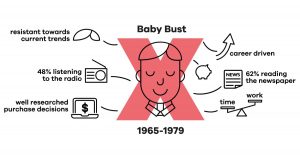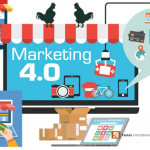Have you ever heard of the different generations who live together in workplaces? Have you ever heard of the differences that each one carries and about the attributes it generates?
Comparing generations is very difficult if we think that generations were formed every 25 years, but now a quarter of a century is practically a century. Things, family relationships, work, etc. change faster and faster. What does not happen, however, is the change, at the same speed, of the mentality of co-workers.
According to this, expert point out that the creation of new genealogical classes are emerging every 10 years. These new classes directly imply how new people act and consume products or services. These impacts reflect on companies, not only on sales, but on the exchange of experiences in the workplace between generations, where the older ones learn with the younger ones (or refuse themselves generating conflict in the office). Today, conflict management and problem solving is done in shorter periods, as young people resolve more quickly and always look for the easiest way to do it.
What to expect for the future? How will the generations continue to coexist and how will they react to the new generations that will arise? What are the characteristics that these generations will bring and what conflicts will come with them?
The technological advancement of these three generations will certainly not be the same for the next generations. With technology experiencing exponential growth moments, we can not predict what will come.
Scientists say that in 2045 will be the year when machines will have their own capacities, what experts call “machinery uniqueness,” where machines can do things on their own, far better and faster than any other human being does.
Finally, we will try in this article to show the characteristics of each generation, their conflicts, how they affect the work environment and what managers are practicing today to soften these raids.
Generation X
The term Generation X is used to label people born after the “Baby Boom” (decade of 20’s to 40’s), a time of significant increase in the US birth rate, after World War II. This generation includes those who were born in the early 1960s until the late 1970s.
The American writer John Ulrich, a contemporary of the Baby Boomers and Generation X, says: the Generation X has always been considered as a group of young people, with no apparent identity, who would face an uncertain evil, without definition, a hostile future. A post-war future, a time of uncertainty and a time with The Cold War, of polarization between good and evil, between the United States of America and the Soviet Union.
It turns out that the generation X grew, went through the hippie phase, had ideals, forgot them and went to make a career into the job market. They saw the emergence of personal computer, Internet, mobile phone, printer, email, etc.. And saw the world change a lot. Much of Generation X came to 30, 40 years and found that to have half a million and to buy, with luck, a modest apartment they will have to pay it until age 60, the way is long and the price is high, very high, sometimes priceless. Around them, children are growing up, parents are dying, dreams are getting old, and exotic holidays to Finland, Morocco or Jamaica are never taken away.
Today, it is increasingly common to see these professionals “kicking the bucket”, you can see thought the internet several blogs and YouTube channels of professionals so far successful, with very good positions and consolidated careers, more than 10 years, in a large multinational that throw everything to paint pictures, study photography, gastronomy, etc. things that make them happy.
Generation Y
Those who born in the late 1970s and early 1990s, the Generation Y, represented around 20% of the global population in 2012, according to Afonso Borges, in his book “Social Target.”
It was the generation that developed in a time of great technological advances and economic prosperity. Generation Y kids grew up having what many of their parents did not have, such as cable TV, video games, computers, various types of games, and more. If Generation X saw the birth of the Internet and technology, the Generation Y was born when it was fully developed. They grew up internalizing it since they were small.
According to researchers who study the generations, Y grew up surrounded by facilities offered by their parents, who obviously wanted to give for their children a better life than they had. They grew up living in action, stimulated by activities, doing multiple tasks. Accustomed to getting what they want, they do not submit to subaltern tasks of the career begging and therefore struggle for ambitious salaries early on. It is common for young people of this generation to switch jobs often in search of opportunities that offer greater challenges and professional growth.
For someone from Generation X, like their parents, for example, this ambition can be considered an act that shows total disinterest and uncertainty in the future.
If you’re from Generation Y, you’ve grown up in a digital world and you’ve always been familiar with mobile devices and real-time communication, so you belong to a group of demanding, informed, and committed consumers. You are part of the truly globalized first generation, who grew up with technology and uses it from an early age. The Internet is an essential necessity for you – after all, answer me: How long can you stay without it without suffering from abstinence? – and based on its easy access, you have developed a great capacity to establish and maintain close personal relationships, albeit at a distance.
Technology and mobile devices enabled each other to communicate as no other generation had done before, allowing them to share experiences, exchange views, compare, advise and create and disseminate content, which is the foundation of social networks. Concerned about the environment and social causes, they have a different point of view from previous generations, who have lived through times of war and unemployment.
Young people of this generation are in the habit of being as multitasking as their smartphone, being able to simultaneously work on more than 1 project, respond to emails, follow the news through some website, talk to co-workers, chat with friends online , listen to music and pay attention to social networks. Now imagine explaining this to that workplace manager…
Generation Z
This generation, which includes those born between the end of 1992 and 2010, is closely linked to the exponential expansion of the internet and technological devices. People from Generation Z are known to be “digital natives”, being very familiar with the World Wide Web, file sharing, smatphones, tablets, and best of all: Always connected.
If we think about it, we will realize that members of this generation have never seen the world without a computer. Another essential characteristic of this generation is the concept of the “world they possesse”, detached from geographical boundaries. For them, globalization was not a value acquired in the middle of life at a high cost. They learned to live with it when they were just a child. As information is not missing from them, they are one step ahead of the older ones, focused on adapting to the new times.
The greatest problems of this generation are related to social interaction. Paradoxically, because they are so connected virtually, many of them suffer from lack of intimacy with verbal communication, which ends up causing various problems with the other generations. According to some analysts, this Generation is also marked by the absence of the ability to be a listener.
Generation Z is somewhat suspicious when it comes to career success and formal studies, most of them no longer believe in doing only one thing for the rest of their lives or spend their whole working life in one company. Many of the Z generation, also, work from home, “the Home Office”, whether in a formal company job or informally, making money from blogs, media, ads sales, YouTubers, advertising, etc. According to experts, there could be a “shortage” of doctors and scientists in the post-2020 world because of that.
In short, this generation has a big problem, according to the others: It is the most closed generation of all, where each one is always closed in their world and isolated through headphones (be it in buses, universities, home, in their jobs…). They are those who listen little and speak even less. For the rest they can be defined as the generation that tends to egocentricity, only worrying about themselves most of the time. For the older ones it may seem that there has been a mechanization of the “office staff”.
Problems
The main conflicts over generations’ conflicts are motivated by the very different characteristics of each other.
In the workplace, for example, it is more common to have an employee of generation X, with several years on the company and who has already fully incorporated its values and vision. He/she’s been in the same job since he/she left college and if he/she ever misses that job, for any reason, he/she’ll feel aimlessly.
This employee must manage at the same time, the analyst ( from Generation Y), who was recently formed, full of novelties, ideas, multiplatform and also the trainee (from Generation Z), still in college, introverted, only manifested when formally invited to such and for all this considered disinterested.
How can we deny that there will be conflicts in this work environment? It is inevitable. In an ideas presentation, perhaps the manager will not understand all the technologies used by the others, perhaps the use of the cell phone, indispensable for the occasion, is not well seen by him. For the rest, younger, for many times a physical meeting is waste of time, counterproductive in times of Skype and video conferencing.
The emergence of creativity from the most recent generations, while always productive and enriching, may lead to productivity losses if not focused. Just as the manager’s ideas, however good they may be, will not be well taken advantage of, or exploited to the full, if he ignores that there is technology that facilitates what he is proposing.
Now imagine another situation: Your company is liberal and bet on new talents. Because of this, it hired a new 25-year-old manager, freshly formed and full of new ideas. Well, among the new commanders of this manager are the “best example” from Generation X, which has more time working for the company than the new boss has of age. How we can do to make him accept the orders from the young boss? How we can make him adapt to the new ideas that come with this new boss? In addition, with new technologies, etc.?
How to solve? After all, the picture only gets worse, people retire later, young people come in early, and the world changes faster and faster.
Solution
Well, the challenge is not easy, but according to HR experts, coaches and other professionals who study the phenomenon, there is a solution. Here are some of the tips that Bob Weinstein from Troy Media gives to managers who need to deal with office conflicts on a daily basis:
- Understand different work styles: Generation X does not like to be managed in the smallest detail, while Generation Y prizes for specific instructions to perform tasks. It is worth remembering that, although the older ones do not appreciate being monitored, they like to know about the process, to understand how everything is accomplished and to be part of it. Generation Y aims more the structure and end result of the process, but they want to make their own decisions and do it as they understand to be better for the process. On the way they like to receive feedback. According to the consultants, the elders want to know the “how”, while young people want to know the “why”.
- Take into account the values: Each generation protects theirs values and the conflicts a result of this can be a threat to them. Generation X, for example, in the anti-war thinking of the 1970s, greatly values team spirit, cooperation and commitment, while Generation Y prefers to make a unilateral decision and act in isolation. Generation Z, on the other hand, values open and honest teams that collaborate together – and like to have many options to choose between them.
- Share perceptions: When employees of two or more generations are involved in a workplace conflict, they can establish a good dialogue by sharing their opinions. Older people may feel the lack of formality and perhaps can feel the offensive way of Generation Z, while young people may feel disrespected if the Xs do not value their perceptions and insights. It is valid to have distinct groups creating frames with points of view that they value the most. It works as a visual reminder to all and shows clearly the difference between generations, and it is a fun activity that does not judge whether each person’s values are wrong or right, just by respecting them.
- Value the best of each generation: You can not change people’s life experiences, but you can work to make your workplace attitudes and expectations the best they can be. A X that knows the market, who is frustrated by the lack of experience demonstrated by a Z, can, through his self-esteem and common sense, become a mentor. If you want to solve problems with a creative solution, go to young people. Studies show that people immersed in digital technology are 10% better at solving problems than their older partners. Do not believe that decisions and solutions can come only from the most experienced. The Y’s are the most creative generation we’ve seen lately. Use the skills of every generation as best you can!
- Look for common points: Generation Y tends to value security and stability even if they need to constantly change jobs, the Xs are more resistant to change, but both attach importance to training and development. Both Y and Z place great value on the flexibility of the worlplace, in addition to appreciating the balance between personal and professional life. The X and Y feel more comfortable with diversity and alternative lifestyles. Discover the common points and also the differences between generations. Help them realize, as a team, how they can use their forces together. Bring to them the consciousness about the generations’ cycle, so they can find out where they fit.
- Learn From Others: Each generation has valuable lessons to teach each other. X’s have the wisdom, knowledge and “tricks” that young people need. Generation Y is known for its loyalty and mediating ability. Generation Z is more attuned to the work environment of the future, to marketing and to market trends
Read more – https://www.oficinadanet.com.br/post/13498-quais-as-diferencas-entre-as-geracoes-x-y-e-z-e-como-administrar-os-conflitos











